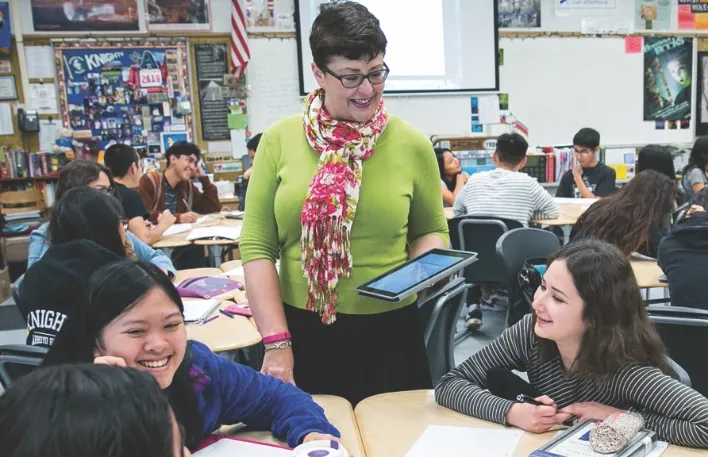- Home
- >
- APU Articles
- >
- News Article
Pathways to Leadership: Equipping California’s Superintendents for Success
August 29, 2022 | Written By Anita Fitzgerald Henck, PhD

Like Russell, most superintendents begin their careers as classroom teachers, eventually earning their administrative credential and working as school principals or district office administrators. In recent years, however, the superintendent role has increased in complexity due to many factors—statewide curricular revisions, school-funding formula changes, greater community engagement, increased school safety concerns, elevated media and social media attention, ever-changing risk management demands, personnel shortages, navigating bond initiatives, and increased board involvement in a union-based environment—signaling a need for advanced preparation.
“In an educational system, ongoing learning is critical to success, and as a superintendent and leader of my organization, I must model this for the staff, students, and families I serve,” said Russell. “Participating in the EdD in Educational Leadership program at Azusa Pacific has stretched me as a learner, personally and professionally. My cohort includes a diverse group of leaders who have expanded my network of trusted colleagues, and along with my university professors have made me a better leader and educator.”
For more than six decades, Azusa Pacific University’s School of Education has educated and prepared California’s teachers, school counselors, school psychologists, and administrators in Azusa and at five regional campuses, partnering along the way with 200 school districts. In 2021-22, the school recommended candidates for 498 credentials, placing APU in the top 10 producers of educator credentials across the state. Building on our strong history, within the last decade we have focused on executive leadership development, providing support and pathways for superintendents, assistant superintendents, and district leaders.
We also noted two concerning patterns and have worked to provide solutions. First, the superintendent turnover rate, especially of urban school districts, has spiked. Second, across the board, there is an increased expectation for superintendents to have a doctoral degree to complement their career experience.
With a commitment to educate and cultivate school leaders, the School of Education launched three initiatives over the last decade to support pathways to district executive leadership for emerging and established professionals. We began with hiring the 2012 California Superintendent of the Year, Kent Bechler ’79, PhD, as associate dean for external partnerships to strengthen relationships with district partners and emphasize executive leadership development, drawing upon his rich experience as a three-time superintendent. At APU, he leads the Superintendents’ Collaborative, which provides ongoing opportunities for area superintendents to gather on campus for conversation, collaboration, and education. Sessions range from engagement with the authors of state legislation to cultivating practices for emotional, financial, and spiritual health. Perhaps most significant are the collegial relationships between peers that emerge in this setting.
Next, we relaunched the EdD in Educational Leadership program with the involvement of a superintendent advisory group and faculty asking, “What should every doctorally prepared superintendent know?” The program redesign culminated in courses focused on understanding data through traditional research methodologies and skills juxtaposed with personal interactions with superintendents who have transformational perspectives on leading change and navigating the competing district demands. Knowing that less than 50 percent of students entering doctoral programs complete them, we also looked at efforts to boost student retention and persistence. The redesigned program now embeds the writing of the dissertation into the coursework, allowing students to immediately practice their new skill and advance toward candidacy, and features a blend of traditional faculty and part-time professors who are superintendents-in-residence teaching leadership courses and serving on dissertation committees. To date, 96 percent of students have completed the program, with significant research and leadership impact on their home districts and beyond.
More recently, Bob Taylor, EdD ’06, superintendent of Walnut Valley Unified School District and APU superintendent-in-residence, launched the Next Generation Superintendent Program. The focus is to provide insight and access for emerging leaders from traditionally underrepresented groups. This yearlong initiative provides formal programming and informal coaching on the soft skills of executive leadership, the political realities of public service, and the practical aspects of multifaceted superintendency. Under the leadership of Taylor and Bechler, emerging leaders from across Southern California are selected for this program, with support provided from their home districts and generous donors to make this program possible. To date, more than 50 leaders have benefited from this unique program.
While a doctoral student, Ryan Maine, EdD ’20, was named principal of Walnut High School, a nationally and locally renowned school in the Walnut Unified School District. “Having superintendents-in-residence teach our classes was transformational,” said Maine. “I would not be in the position I am right now if it weren’t for those Saturday classes—seeking advice, bouncing ideas off of them, and seeing what has succeeded for them. I continue to communicate with those superintendents for advice and guidance, and this provides lifelong professional value.”